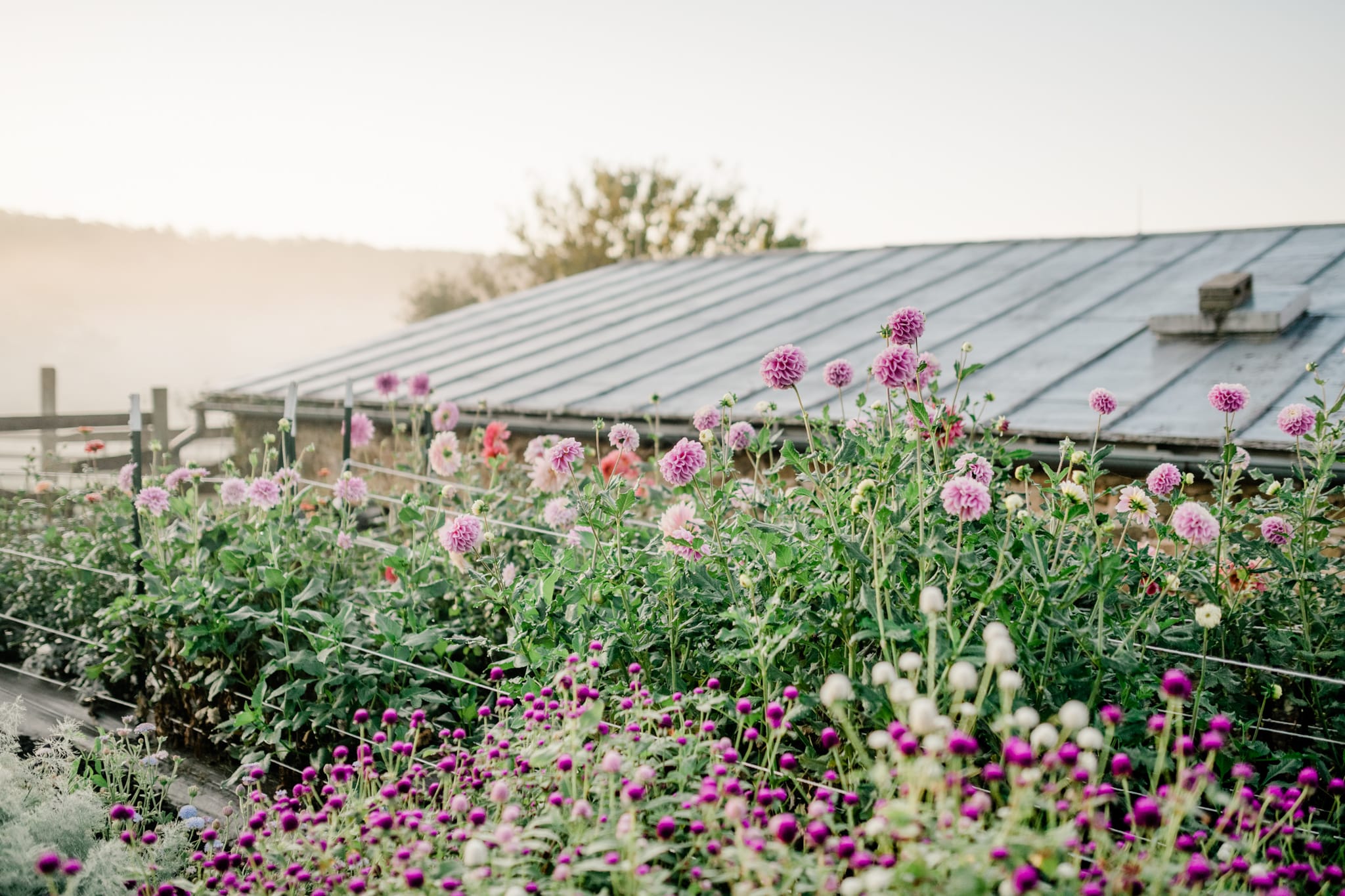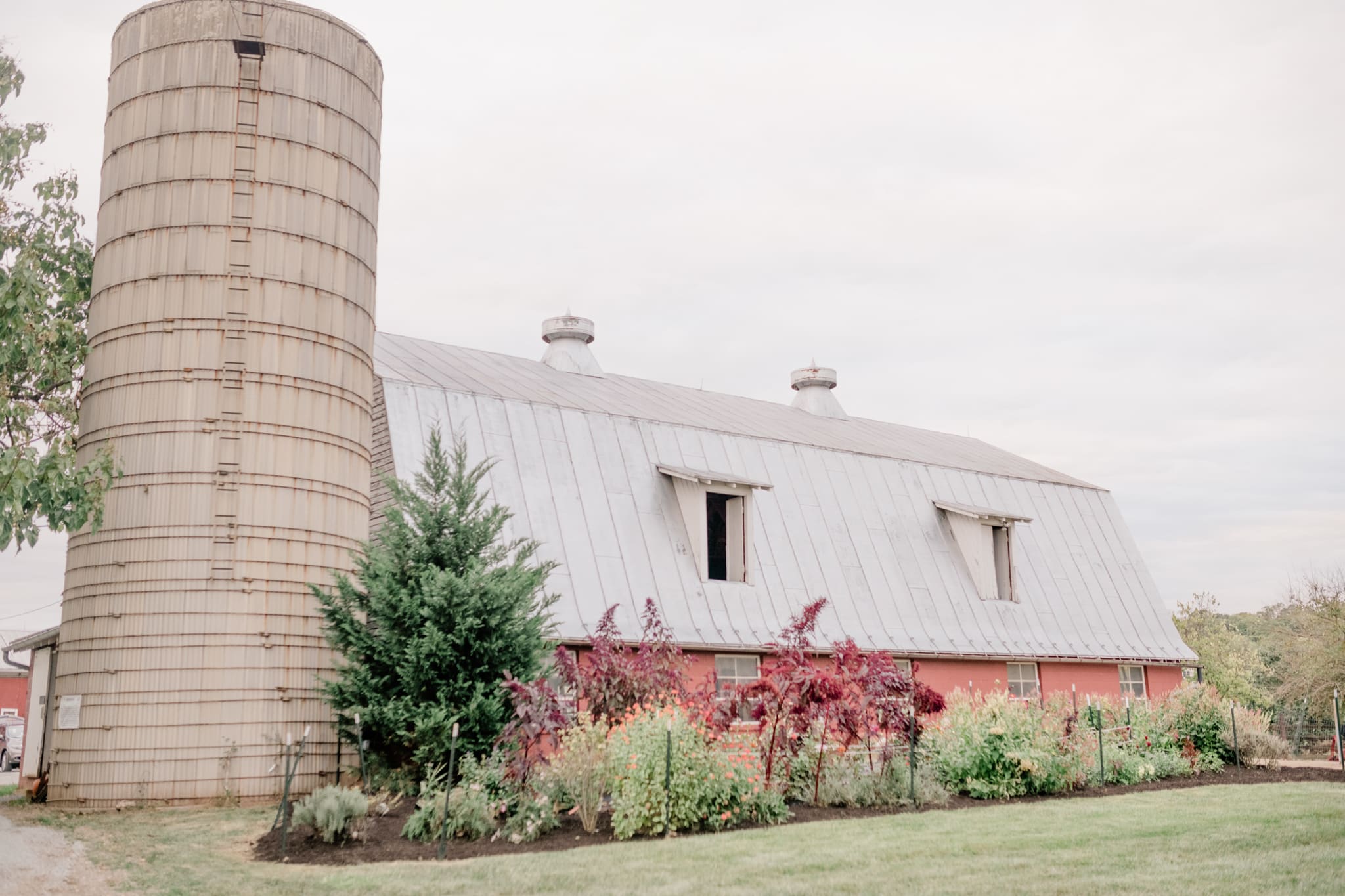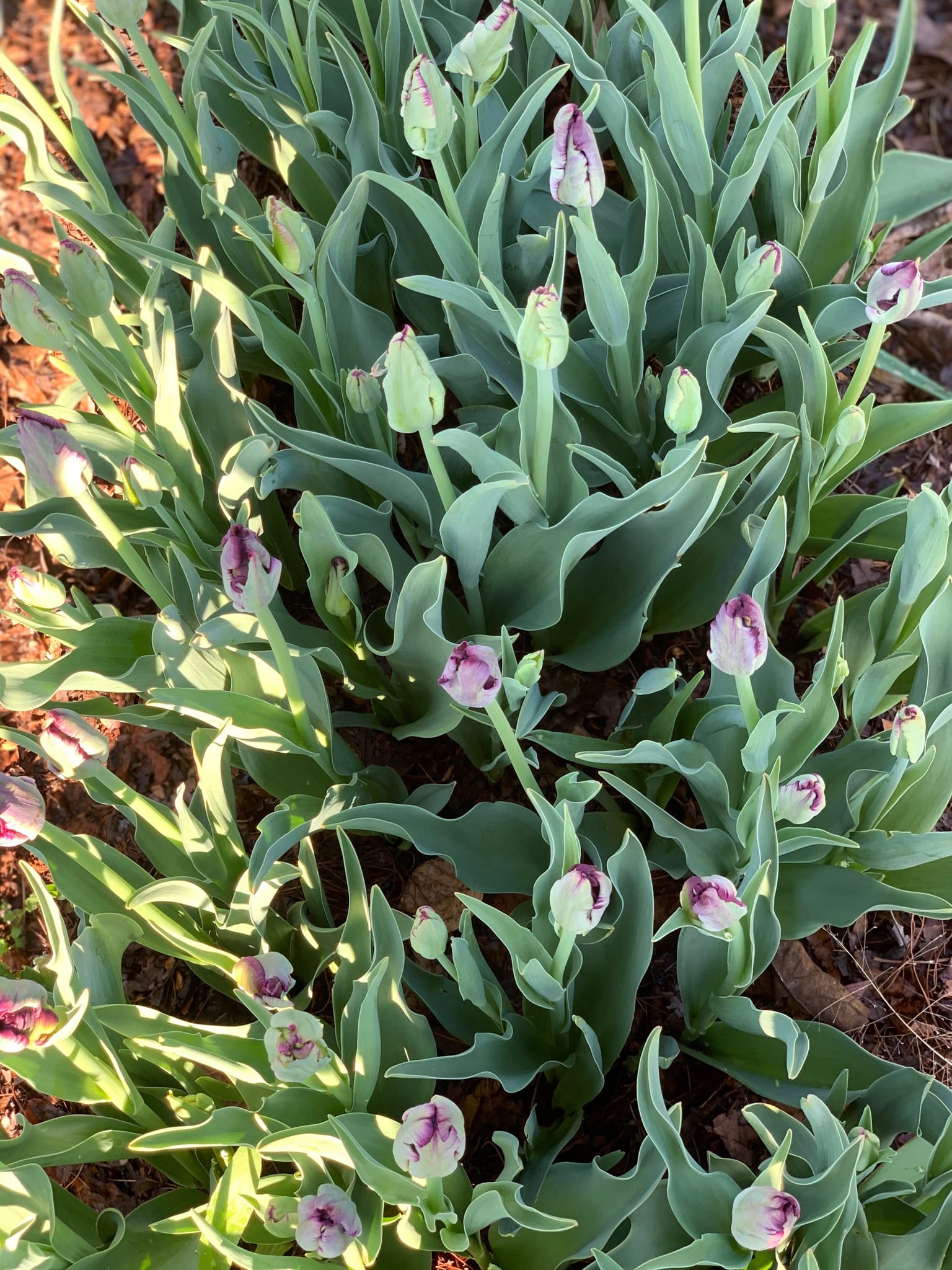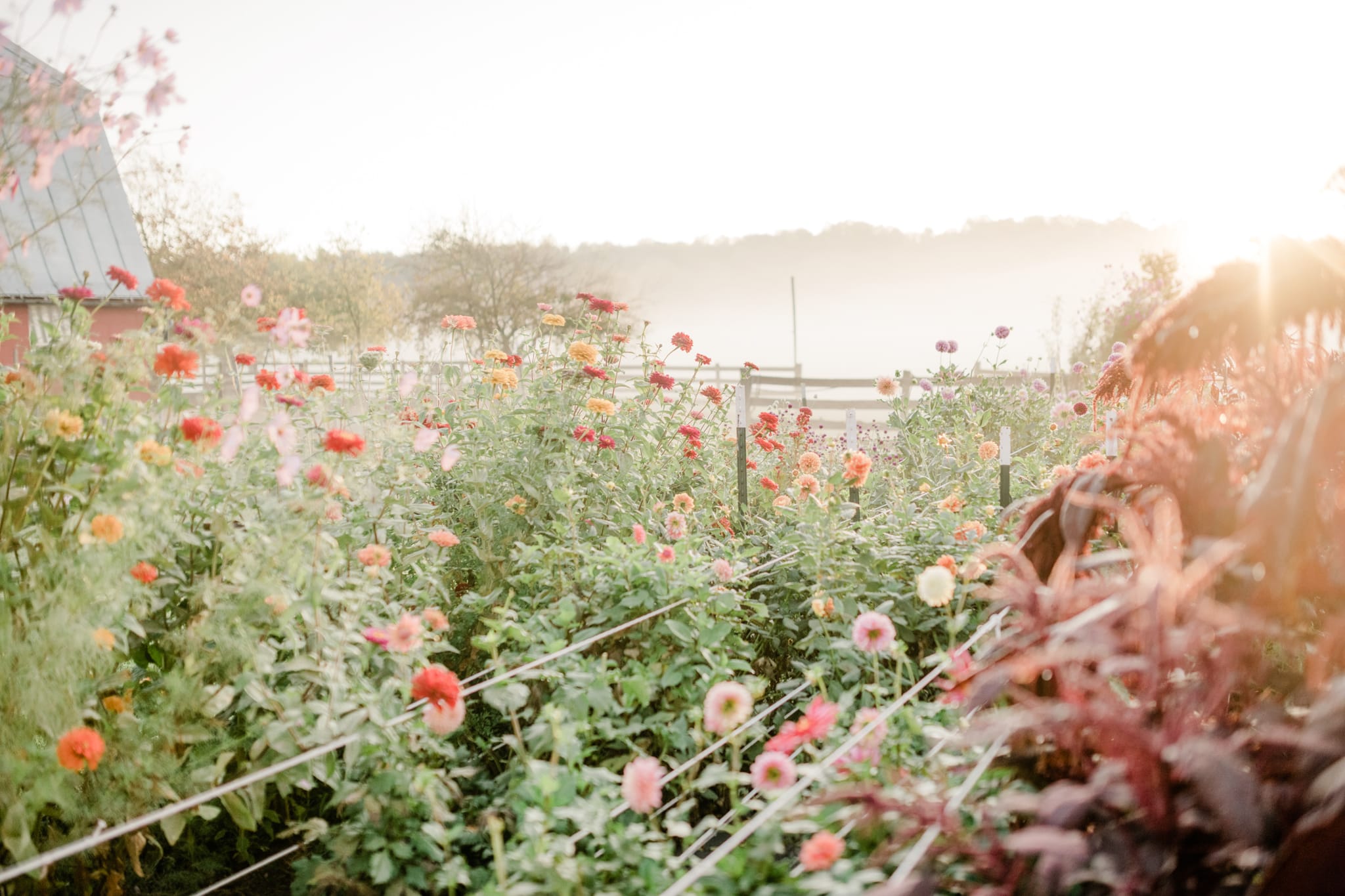T oday I planted seven hundred daffodils. They have names like Can Can Girl, Yellow Cheerfulness, Replete, and my favorite, British Gamble. I planted them along a stone wall my dad recently discovered behind the manor house, which dates to the 1850s. My parents bought the house and the land it sits on five years ago, naming it Hope Flower Farm. Although that sounds like a call for optimism, the place is actually named after Mr. Hope, the tenant farmer who cared for the property for forty years before my parents bought it. He was an excellent steward, but twenty-five acres was too much for him to maintain alone, so parts of the property grew over with weeds and brambles. My dad found this wall under one such bramble patch.

I shouldn’t feel this sore from planting so few bulbs, but I’m still new to this, so I was overly cautious—my feet and legs throb from hovering over holes for hours. Daffodils should be five inches deep, so I had carried a stick I broke to be that length and checked every bulb’s depth before covering it. The precision made the work slow, but it calmed my worry that they would be planted too close to the surface. Our winters, like everyone else’s, are increasingly mild. While I was working, I had silently prayed our bulbs wouldn’t be “too excitable,” as Sylvia Plath once described her tulips that arrived before winter was truly gone.
These daffodils, like all the flowers we grow, will be used in the floral designs we create for weddings and events on our farm, or sold retail, directly to our northern Virginia community. My mother has been a florist for almost thirty years. Ten years ago, my father quit his job in telecommunications to work with her. Upon purchase, the farm was a fun side venture, a place for my mom to teach floral design and to dabble with growing her own more expensive stems she would typically have to buy from wholesalers, like peonies and dahlias. But the primary source of their revenue—weddings and events, often at big venues in Washington, D.C.—evaporated as COVID-19 halted the entire hospitality industry. So they leaned into the last stable part of their reality: the land. My parents’ plan? Grow more flowers than ever, then figure out what to do with them.

The sun is already setting in the December sky, so the work day is done. I move my stiff legs and walk past the old, red dairy barns on the property toward the tenant house. It is pleasantly warm for the week of Christmas, but the warmth only lasts a few hours, when the sun briefly falls on your back. Our daily labor is not easy in the winter months, but it is short. In the summer, I work twelve-hour days to make the most of every moment of sunlight. Sometimes it makes me miss my old nine-to-five job.
When I enter the small house where Mr. Hope and his wife used to live, I kick off my boots and wash up. After inspecting the dirt under my fingernails, I notice a hole in my jeans. It’s a friendly reminder that I’m not in a suit. That’s something I’ve never missed.
"Our daily labor is not easy in the winter months, but it is short. In the summer, I work twelve-hour days to make the most of every moment of sunlight. Sometimes it makes me miss my old nine-to-five job.”
A year ago I spent my days in business attire, at a desk, reading several hundred intelligence reports a week. I did this while working as an analyst at the Central Intelligence Agency. In contrast to our farm’s manor house, the centerpiece of the CIA campus is the cold, concrete Old Headquarters Building. (I used to laugh with colleagues about how ironically Soviet it looked from the outside.) The campus was beautiful in its own way, though—meticulously landscaped; green from the surrounding Virginia old-growth forest; and often foggy because of its proximity to the Potomac River, which added to the mystique of the place. The only problem was that I rarely got to enjoy it. I was usually in a suit, in a gray cubicle, inside an office with no windows.
I worked at the Agency for seven years. During that time, I developed incredible friendships and had many unique experiences, including traveling internationally, writing for the President, and even briefly running the Agency’s Twitter account. But I knew deep down after my first few months that I didn’t fit there. The bureaucratic environment made me feel like a caged dog. I also found the best parts of the job—those portrayed in Hollywood films (inaccurately, it turns out)—surprisingly boring.
It took me years to acknowledge this malaise, and then years more to find the courage to leave. The admission came in an easy, unexpected moment at a party, when someone I had just met was peppering me with questions about my CIA career. I told them I didn’t want to talk about it. They said they understood; I couldn’t talk about classified work. “No,” I replied, “it’s just that it’s boring.” I can still remember the person laughing, thinking I was being cagey. But I wasn’t being wry. In a lucid moment, I had realized how bored I’d become at a job most thought was cool.
The courage that I would need to leave the Agency did not come as easily as my moment of lucidity. Ultimately, I would leave to join my parents, to support their thriving florist and floral education business, and to help on their farm. But before I did so, I spent years resisting their offers to join them because I was afraid to give up the two primary benefits of my Agency life: financial security and a sense of mission.
"I realized that I was well-off as far as money was concerned, but when it came to living—really living—I was impoverished.”
The federal government truly is one of the last US employers that promises a career—a forty-year plan—not just a job. The benefits are excellent, the salary growth is practically automatic (albeit slow), and everyone there is happy to see you age within the safety of bureaucratic structures until retirement. Could I really give up a secure government salary for one that could change, quite literally, as quickly as the weather? My mom and dad couldn’t even give me a clear answer on how much money they made because it fluctuated drastically year to year.
In a traditional sense, I had “made it” by getting the analyst job. My family is mostly composed of small business owners who didn’t graduate college. They didn’t understand my desk job at all, but they understood that I had successfully broken into a white-collar world that would have excluded them, had they cared to join it. They used to remind me, too, how lucky I was for the security, especially as my wife and I contemplated having children.
But as my boredom and sense of being caged grew worse, I began developing a broader sense of what financial security meant. I started to include new variables in my cost-benefit calculations, big things such as “health” and “freedom,” alongside small things like “better tomatoes.” I realized that I was well-off as far as money was concerned, but when it came to living—really living—I was impoverished. Sitting between cubicle walls under fluorescent lights, I was miserable. My friends and my wife worried about my health. I missed the feeling of working with my hands and earning tangible rewards. Having grown up working for my grandfather on his farm, I wistfully recalled how every day, week, and season yielded a palpable bounty—fresh produce, in our case.

In contrast, my intelligence work was mostly an abstraction: I wrote verbose analyses of low-probability, hypothetical threats. My output—written analysis—rarely reached an end customer, and if it did, there was no guarantee I’d receive feedback. I rarely felt like my labor was making anything.
As I mulled over this broader definition of wealth, I had a poignant conversation with my dad. I had been working with him on the farm one afternoon, lamenting that I hadn’t found the perfect exit strategy from the Agency yet.
“Alex,” my father said, with a tone he reserved for when my babbling interrupted the quiet only farmers know, “if you’re waiting until you have the perfect plan to leave, you aren’t ready to leave.” He wiped his hands on his jeans, leaving streaks of red, clay-heavy mud on the denim.
I looked down at the big box in front of him and realized we were done. We had just planted thousands of tulip bulbs. My back was sore, but in a way that felt healthier than the soreness I used to feel as I atrophied in my cubicle. “Because the perfect plan doesn’t exist?”
"Well, that’s probably true, yes. But that’s not what I meant." He sighed and looked at the sky, choosing his words carefully. "I mean your wanting a perfect plan sounds, well, governmental. Maybe perfect plans do exist. I don't know. But it's just not the right thing to want."
The whole reason my dad left the corporate world himself was to stop planning so much, to enter a world that is fluid and ever-changing. His work day is riskier as a farmer, but also more exciting, full of more potential. To him, the imperfection of farming, and of small business, is the best part.
When he said this to me, my dad didn’t know it was exactly what I needed to hear. If I’m told I can’t do something, I fight to prove that person wrong. When my dad accidentally challenged my courage and said I wasn’t ready to leave, I suddenly was. I immediately knew he was right. I’d been waiting for the perfect plan to leave for years, but the truth was, I wouldn’t have known the perfect plan if it had slapped me in the face. What I had really been waiting for was the courage to leave with no plan at all.

There was, however, one last hitch: the CIA’s mission still had a hold on my heart. Could I really trade in the pride I felt working to protect America for growing flowers? It felt more important to help the Pentagon understand the dangers of foreign weapon developments than it did to successfully grow zinnias from seed. I’ve always hated quitting anything, and quitting the Agency was especially difficult. I had made an oath to defend the Constitution against all enemies, and I meant the words of the oath when I said them. I believed in their importance.
Maybe I was deluding myself then (and continue to delude myself to justify the time I spent there) but I saw helping protect America as an inherently worthwhile job. A part of me considered that my boredom and diminishing health might simply be the cost of working for something bigger than myself. I thought my efforts were vital to America’s health, even if the results were less tangible than tomatoes on the vine. Maybe being a civil servant required sacrifice in this way. With these thoughts swirling in my head, I couldn’t leave the Agency unless I felt like, in doing so, I could uphold my oath in some way.
"Could I really give up a secure government salary for one that could change, quite literally, as quickly as the weather?”
A couple of years into Donald Trump’s presidency, I was reading an article by Timothy P. Carney, a writer for Politico, who was trying to explain the roots of Trump’s electoral victory. In his analysis, Carney explains that conservative regions of the country that had voted against Trump during the Republican primaries had a major common denominator: close-knit community institutions and civil society. By comparison, Carney observes, such social cohesion has been disintegrating across much of the US over the past several decades. The places with active community centers, churches, and high rates of local civic engagement weren’t wooed by Trump’s promise to bring back the American dream. They, unlike much of conservative America, were still living the dream because they had community support structures to lean on. This explanation immediately hit home for me. I knew all about crumbling communities and the risks they posed to individuals and to the country at large because I had seen it happening in northern Virginia, where my family had been for generations.
Ultra-fast growth in recent decades resulted in clumsy urban and suburban development. One crucial aspect of this has been developing almost every piece of land into housing. As farmland and open spaces turned into suburbia, some in my community had begun to fight to protect it—to demonstrate to local governments that non-residential uses of this land provided value, that horse country and trails and wineries were vital gathering spaces for a community and essential to individuals’ health. I've long been aware and even supportive of these efforts, but it was only after reading Carney’s article that, for the first time, I saw them as vital to the longevity of our country. And I realized that working for these causes, and helping my parents develop their farm into a safe space for the public to visit and gather, would be a way to uphold my oath.
After all, my oath was to protect against all enemies “foreign and domestic.” There I was studying military developments or political maneuvering in foreign countries while ignoring the crumbling of my own home. It started to feel absurd to me. As Wendell Berry wrote, “A community is the mental and spiritual condition of knowing that the place is shared… It is the knowledge that people have of each other, their concern for each other, their trust in each other, the freedom with which they come and go among themselves.” Where I lived, there wasn’t much of a community as Berry defined it. Work needed to be done to build such a community, to create shared places where a community could flourish. And I could do that work. As an Agency officer, I realized that it would become impossible to uphold an oath to defend a homeland if that homeland ceased to exist. Suddenly, my oath to defend the Constitution not only seemed to permit me to focus more on my local world, it demanded it.
With this clarity of purpose, I told my parents I was ready to come work for them, and I put in my two weeks’ notice at the Agency. The bureaucracy met the decision with a shrug. I’ll never forget how hard I laughed when I submitted my formal resignation letter to HR via email, and the reply was simply: “Okay.” I tortured myself for years over a decision that, once finally made, seemed so anticlimactic. “Okay,” if weirdly succinct, was actually the appropriate response. With the decision made and documented, I was shocked by how calm I felt. My new reality had arrived, and my mind and body were ready to get on with it. I couldn’t remember why it had taken me so long to do this.
"Could I really trade in the pride I felt working to protect America for growing flowers?”
My leaving was met with sadness from friends, but also many comments like “I knew this was coming.” I had never been quiet about my dissatisfaction with the job, but I was still surprised that most of my friends knew I’d “get out.” Because, until shortly before I made the decision, I hadn’t known that about myself. I was also surprised by how many people asked me how I found the courage to leave—or asked me if I judged them for staying. I told them what I learned from my dad: waiting for the perfect plan to leave was a Catch-22 that would have trapped me forever. And I told them I didn’t judge them for staying if they were happy, as most of them were. Although I concluded that the job didn’t fit me, it was a great fit for others. Many of my friends felt that their Agency career was their dream job, and I think they were right. They succeeded and did great work within the Agency’s bureaucratic structures and bizarre culture, and without feeling caged. I have enough humility to know that my departure was about what was right for me, not anyone else. And, personally, I’m glad to know good people continue to work for the Agency’s mission, while I’ve moved on to a more localized one.
A year after leaving government service, I can say that my decision has held up. I could give up the financial security for a different sense of mission. Even in the face of the pandemic, which struck about a month after I left government service. Maybe particularly because of the pandemic.
One silver lining of the chaos caused by COVID-19 is that it was the ultimate test of my dad’s perspective that perfect plans aren’t worth stressing over. Not only were our plans for 2020 imperfect, they were blown to smithereens. The educational conferences for floral designers in New York City and Ireland we were to host and the dozens of weddings we were supposed to provide flowers for were all canceled. But with my dad’s perspective driving everything, we just shrugged and did the only thing we could: grow more flowers. This strategy didn’t make up for all of the lost revenue, but it provided more than enough, proving even in the worst of circumstances that the financial security I had given up wasn’t as special as it had always seemed.

And these extra flowers, in turn, helped me achieve my new mission faster than I thought I would. The focus on our land gave us an opportunity to open our farm to our community, which was desperate for ways to be outside safely. Instead of bringing wedding flowers to big venues in Washington, D.C., we started hosting smaller, intimate weddings at our farm. Instead of using everything we grow for wedding work, we offered these blooms to the public. We hosted a Mother’s Day event, so local moms could get a photograph with their family among our peonies and leave with a bouquet. We hosted a fall celebration of our dahlias, and the local community flocked to see the rare flower in bloom. I felt like I was honoring my oath with each event.
As year two of the pandemic begins, I begin the long waiting game on those daffodils and everything else we’ve planted to see if they and our imperfect plan bloom. Even if they don’t, I am calmly confident our farm will provide.
Although the farm is not large, it is too much for my dad and I to maintain by ourselves, just as it was for Mr. Hope. As a consequence, we let swaths of the land go to hay. When you approach the property and see these patches, you may even wonder if someone is here. I’m proud of our carefully landscaped flower beds, but these grown-over parts are my favorite. They are beautiful for their mystery. The whites and golds of wild flowers make home to a menagerie of small mammals and birds I didn’t even know existed before I started working on the land. These patches are full of the optimism we didn’t initially intend in our farm’s name. These patches have an aura best described as the exact opposite of my old, gray cubicle. They remind me of the boring certainty I traded in for unlimited potential, both negative and positive. They are proof that having no plan—let alone a perfect plan—can still result in thriving beauty and life. ◘
